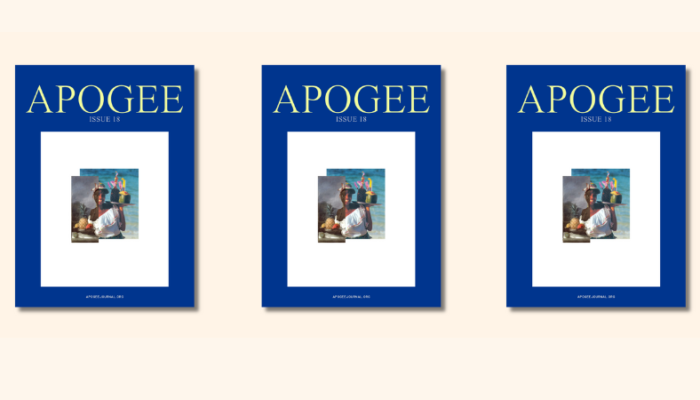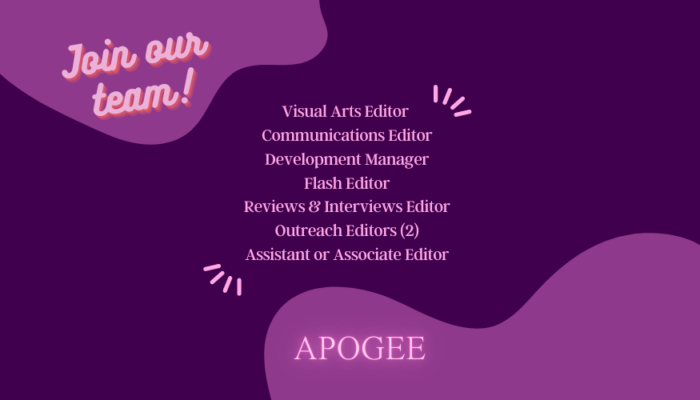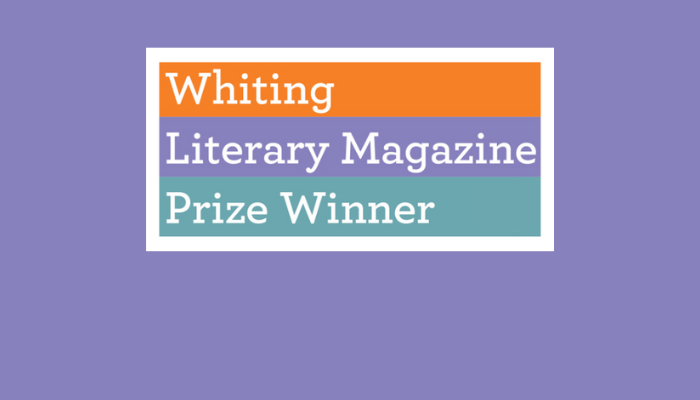We are so thrilled to welcome Safia Jama to Apogee Journal’s editorial team as our newest Nonfiction Editor! See what she has to say about finding community, seeing herself in the work of writers and artists of color, and what it means to love “work that doesn’t care to be likeable.”
Apogee Journal [AJ]: Welcome to Apogee. Tell us a little about how you came to Apogee Journal. What brought you here?
Safia Jama [SJ]: I bought my first copy of Apogee Journal at the Housing Works Bookstore two years ago. I saw a painting of a black woman on the cover, her hands clasped over a white dress. (I later realized this ‘painting’ was in fact a beautiful photograph by Rachel Eliza Griffiths.) Riding the subway home, I began to read this journal that seemed unlike any other. I remember how my own brown hands mirrored the hands on the journal’s cover. I read an interview with Rich Benjamin. In it, he talks about his study of “whiteopias,” the virtually all-white communities situated near idyllic nature settings. I remember thinking about mountains and rivers and white people hiking with their families as I rode the F train back to my ethnically diverse neighborhood in Queens, which has very little green space. Holding a copy of Apogee Journal in my hands, I intuitively knew this was space I wanted to enter.
More recently, I attended some of the journal’s readings with my friend and fellow poet Leila Ortiz. What I found was a really positive space, and I knew I wanted to contribute. I’m so glad to be a part of the Apogee community.
AJ: As a poet and nonfiction writer, how do you think your work in multiple genres will influence your role as Apogee’s Nonfiction Editor?
SJ: I’m excited about that cross-pollination. Writers today are expected to choose. I’m a poet. I’m a fiction writer. On the one hand, it’s a wonderful and necessary thing to commit to our craft. Yet let’s keep in mind that George Eliot wrote editorials and novels. Zora Neale Hurston wrote fiction and traveled through the American South to research black folklore and music. Toni Morrison wrote The Bluest Eye and worked as an editor and later wrote Playing in the Dark: Whiteness and the Literary Imagination.
I think about how Claudia Rankine’s Citizen draws upon art and prose and criticism. The rigid lines separating various genres are breaking down, and I think it’s healthy because it disrupts the status quo and leads to new ways of thinking.
AJ: What do you look for in a piece of writing as an editor? What type of writing seizes your attention and makes you do a double-take?
SJ: There’s an intimacy to the writing I love, a vulnerability. In the age of social media, we’re all expected to be extroverts. The great thing about literature is that you don’t need to be an extrovert to write it. I wonder what will happen to literature when there’s an imaginary “Like” button in the writer’s imagination. I want to read work that doesn’t care to be likeable.
As an editor and a reader, I’m hungry for new voices and new stories. I’m hungry for work that risks clarity without sacrificing complexity. I’m craving work that speaks the honest and messy and complicated truth. I think empathy is important too.
AJ: Apogee’s mission is to bring writing and artwork that explores identity politics. What role does identity politics play in your own writing?
SJ: Identity politics plays a significant role in my writing. I don’t have the privilege to avoid it, just as I don’t have the privilege to forget that I’m a woman walking down the street or the only black person on the writing faculty.
Before I wrote poetry, I spent five years reading books trying to understand race because I was afraid to say the wrong thing. I was afraid I would get in trouble and people would know that I really didn’t understand my own identity.
I’m the daughter of a Somali father and an Irish American mother, and I grew up in Queens. I didn’t have a language to talk about my racial identity since my family rarely spoke about race. People thought I was Indian or Dominican, maybe. I had a breakthrough when I read Randall Kennedy’s Sellout, and then I wrote a poem called “Sellout,” in which I explored the shame surrounding my identity. That poem taught me that I had banished my black self. That breakthrough poem led me to Cave Canem and helped me find a community that would nurture me as an artist.
Right now, I’m thinking a lot about the black imagination and writing poems about womanhood in an unabashed way. I just finished a poetry manuscript, so I’m taking it easy. The other day I wrote a poem about the disappointment of boiling spinach.
AJ: Describe the last time you felt yourself deeply moved by a piece of writing.
SJ: A month ago, I read an editorial by Tonya Pinkins, who had just left behind her starring role in a Broadway production of Mother Courage. She gave up the role of a lifetime because she didn’t see her character as “delusional” while the white, male director did. Moreover, she wanted the adaptation to reflect the specific historical context of the war in Congo as opposed to a generalized African war. Pinkins inspired me from the first line of her piece, which reads: “Twice this year (but too many times in my career) my perspective as a Black woman was dismissed in favor of portraying the Black woman, through the filter of the White gaze.” Reporting on her choice to leave the production, The New York Times edited her quote and removed her name from the story’s lead: “The lead actress said her ‘perspective as a black woman was dismissed.’”
I am inspired by Pinkins’s artistic integrity and her insistence that #BlackPerspectivesMatter.
AJ: What are some exciting moments in creative nonfiction that are happening today? How do you hope to engage with these moments as a writer and editor?
SJ: The most exciting thing in American nonfiction right now is the Black Lives Matter movement. I think that there is great potential right now to revitalize our conversations about diversity. We can draw a line between the video of Sandra Bland pulled out of her car by a police officer and a movie industry that refuses to recognize the humanity of black women.
I’m engaging with this moment by stepping into the role as Nonfiction Editor of a journal I believe in. I can’t wait to read all the new work.
SAFIA JAMA was born in Queens, New York to a Somali father and an Irish-American mother. A graduate of Harvard College, she earned an M.F.A. in poetry from Rutgers University-Newark while teaching undergraduate writing and interning at the Poetry Society of America. A Cave Canem graduate fellow, her poetry appears, or is forthcoming, in RHINO, Toe Good Poetry, Reverie, The New Sound, and the Cave Canem Anthology XIII. Her nonfiction has been spotlighted by the Poetry Foundation blog and can be found at The Volta, English Kills Review, Bryant Park’s Word for Word, and NPR’s SchoolBook.
Photograph by Jess X.




